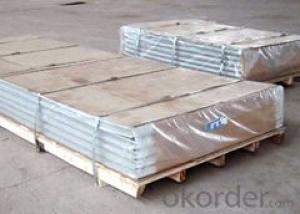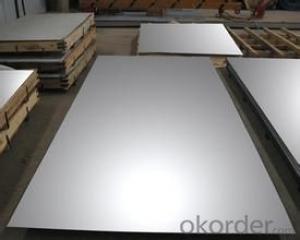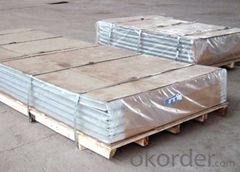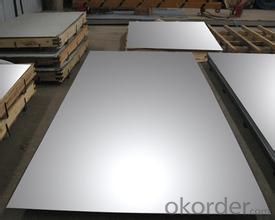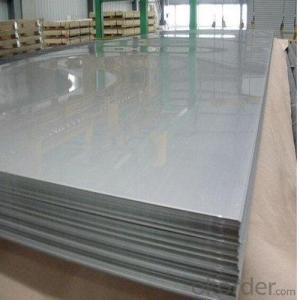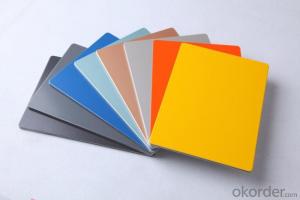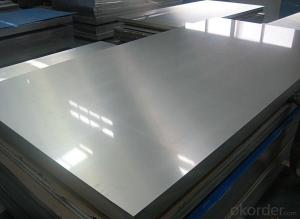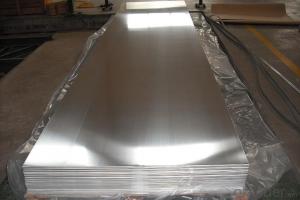Aluminum Sheets for Fuel Tanks - Construction Grade Aluminum Sheet/Plate
- Loading Port:
- China Main Port
- Payment Terms:
- TT OR LC
- Min Order Qty:
- -
- Supply Capability:
- -
OKorder Service Pledge
OKorder Financial Service
You Might Also Like
Aluminium is a relatively soft, durable, lightweight, ductileand malleablemetalwith appearance ranging from silvery to dull gray, depending on the surfaceroughness. It is nonmagnetic and does not easily ignite. A fresh film ofaluminium serves as a good reflector (approximately 92%) of visible lightand an excellent reflector (as much as 98%) of medium and far infraredradiation. The yield strength of pure aluminium is 7–11 MPa,while aluminium alloys have yield strengths ranging from200 MPa to 600 MPa. Aluminium has about one-third the densityand stiffness of steel. It is easily machined,cast, drawn and extruded.
Aluminium alloys (or aluminum alloys; see spellingdifferences) are alloysin which aluminium(Al) is the predominant metal. The typical alloying elements are copper, magnesium,manganese,silicon,tin and zinc. There are twoprincipal classifications, namely casting alloys and wrought alloys, both of which are furthersubdivided into the categories heat-treatableand non-heat-treatable. About 85% of aluminium is used for wrought products,for example rolled plate, foils and extrusions.Cast aluminium alloys yield cost-effective products due to the low meltingpoint, although they generally have lower tensile strengthsthan wrought alloys. The most important cast aluminium alloy system is Al–Si,where the high levels of silicon (4.0–13%) contribute to give good castingcharacteristics. Aluminium alloys are widely used in engineering structures andcomponents where light weight or corrosion resistance is required
Specification:
Alloy: AA1050, 1060, 1100,AA3003, 3005, 3015, 5052, 5754, 5083,8011, etc
Temper:H14/16/18/22/24/32, HO etc.
Thickness:0.2mm—100mm
Width: 100mm—2300mm (Can be slitted)
Application: Roofing, Can stock, Marine plate,Anti-slipery purpose in vehicles, packing and appliance.
Features:
1. Excellent quality of products
2. Quick delivery
3. Best service to clients
4. BV,SGS avalible
5. No buckle o waveness
6. Tension leveling
7. Certificate of Origin
8. Form A,E
Packaging Detail:
Carton ,Woodenpallet with plastic protection packing ,standard seaworthy packing or as yourrequest.
ProductionCapacity:
AnnualProduction capacity of 600,000 tons.
Products areexported to United States, Canada, U.A.E, Brazil, Mexico,Thailand, Vietnam,Nigeria etc, over 100 countries andregions all over the world.
Production Line:
CNBM aluminumproduction base is comprised of 18 aluminumannealers, 10 coil and foilmills, 4 continuous production lines, 2hot rolling production line and 3prepainted lines.
FAQ:
1. What is the form of payment?
Normally 30% TT, L/C
2. Type of quotation?
FOB, CFR, CIF
3. Port of loading?
Shanghai port
4. Delivery time?
30 day after client’s deposit
- Q: What are the dimensions of standard aluminum sheets?
- The dimensions of standard aluminum sheets vary depending on the intended application. However, common sizes for standard aluminum sheets range from 0.02 to 0.249 inches in thickness, 36 to 72 inches in width, and 96 to 144 inches in length.
- Q: What are the properties of anodized aluminum sheets?
- Anodized aluminum sheets have a protective oxide layer that provides increased corrosion resistance, durability, and a decorative finish. They are lightweight, non-toxic, and offer excellent heat and electrical conductivity. Additionally, anodized aluminum sheets are easy to clean, resistant to fading and scratching, and can be dyed in various colors for aesthetic purposes.
- Q: Are aluminum sheets suitable for outdoor signage?
- Yes, aluminum sheets are suitable for outdoor signage. They are durable, weather-resistant, and can withstand various environmental conditions such as rain, wind, and sunlight. Additionally, aluminum sheets can be easily customized, making them ideal for outdoor signage applications.
- Q: Are 101 aluminum sheets suitable for lightweight structural applications?
- 101 aluminum sheets are appropriate for lightweight structural applications. Aluminum is well-known for its lightweight characteristics, making it a popular option for structural applications that prioritize weight reduction. The 101 aluminum alloy is specifically engineered to provide high strength and excellent formability, making it an ideal selection for various structural components. These sheets can be utilized in industries such as aerospace, automotive, and construction, where the emphasis is on reducing weight while maintaining structural integrity. Furthermore, 101 aluminum sheets possess good corrosion resistance, rendering them suitable for outdoor applications or environments with elevated moisture levels. In conclusion, 101 aluminum sheets are a dependable choice for lightweight structural applications due to their strength, formability, and corrosion resistance properties.
- Q: I saw a guy on ebay take a washed out paint can fill it full of lighted charcoal bricks and a tin can in the middle. He was melting aluminum cans in there then pured it into a mold. Does this really work and does anyone have any good ideas on how else to do this?
- Aluminum alloys melt at around 1200 degrees, aluminum cans maybe somewhat lower, but I doubt a tin can would hold up long enough to melt much aluminum, and you would need to be very careful, any moisture in your mold will cause the aluminum to literally explode back into your face. I am not saying it couldn't be done, but you really would need lots of safety equipment before trying it.
- Q: Are aluminum sheets suitable for lighting fixtures?
- Lighting fixtures can be made from aluminum sheets, which are a versatile and durable material commonly used in their manufacturing. Aluminum offers numerous advantages that contribute to its popularity for this purpose. First and foremost, aluminum's lightweight property makes it easy to handle and install lighting fixtures. Additionally, it possesses high corrosion resistance, ensuring that the fixtures can withstand various environmental conditions without deteriorating or rusting over time. Moreover, aluminum boasts excellent thermal conductivity, efficiently dissipating heat generated by the fixtures to prevent overheating and extend their lifespan. Furthermore, aluminum can be easily shaped and formed into different designs, making it ideal for creating visually appealing lighting fixtures. It can be extruded, rolled, or stamped to achieve various shapes and sizes, allowing for a wide range of creative possibilities. Moreover, aluminum is a cost-effective material compared to other metals commonly used in lighting fixtures, such as brass or copper. It is readily available and has a lower price point, making it a more affordable option for both manufacturers and consumers. In conclusion, aluminum sheets are a suitable choice for lighting fixtures due to their lightweight nature, corrosion resistance, excellent thermal conductivity, versatility in design, and cost-effectiveness.
- Q: This question asks for a detailed explanation of the steps involved in the manufacturing process of aluminum profiles specifically designed for use as exterior cladding.
- <p>The process for manufacturing aluminum profiles for exterior cladding involves several key steps. First, aluminum ingots are melted in a furnace. The molten aluminum is then poured into molds to create extrusion billets. These billets are heated and fed into an extrusion press where they are forced through a die with the desired profile shape. After extrusion, the profiles are cooled and then cut to length. They may undergo further processing such as anodizing, painting, or powder coating to enhance their durability and appearance. Finally, the profiles are inspected for quality, packaged, and shipped to construction sites for installation as exterior cladding.</p>
- Q: Are aluminum sheets resistant to chemicals?
- Yes, aluminum sheets are generally resistant to many chemicals. Aluminum has a natural oxide layer on its surface that provides a protective barrier against corrosion and chemical reactions. This oxide layer is stable and resists most acids, alkalis, and organic solvents. However, aluminum can be corroded by certain chemicals, such as strong acids or bases, and some halogenated compounds. Additionally, prolonged exposure to certain chemicals or extreme conditions may weaken the oxide layer and make aluminum more susceptible to corrosion. Therefore, while aluminum sheets are generally resistant to chemicals, it is important to consider the specific chemical environment and potential interactions before using aluminum in certain applications.
- Q: Can aluminum sheets be used for soundproofing?
- Yes, aluminum sheets can be used for soundproofing. Aluminum has a high density and is an effective barrier against sound transmission. When used in combination with other sound-absorbing materials, such as foam or fiberglass, aluminum sheets can help reduce the transmission of sound waves and minimize noise pollution. Additionally, aluminum sheets can be easily installed on walls, ceilings, or any other surfaces, making it a versatile option for soundproofing applications.
- Q: Aluminum siding is essentially maintenence-free, extremelydurable, and is a great insulator, even better than brick. Brickleaks air through the mortar between the bricks, especially in olderhouses that need tuckpointing. My question is, do you feel sidingstill has a declasse connotation, or is it getting more acceptableas the years go on?
- Can't beat brick!!!
Send your message to us
Aluminum Sheets for Fuel Tanks - Construction Grade Aluminum Sheet/Plate
- Loading Port:
- China Main Port
- Payment Terms:
- TT OR LC
- Min Order Qty:
- -
- Supply Capability:
- -
OKorder Service Pledge
OKorder Financial Service
Similar products
Hot products
Hot Searches
Related keywords
